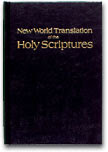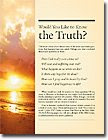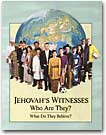I was speaking to two local Mormon missionaries recently who told me that after the Fall of Adam and Eve, they repented, were forgiven, baptized, and Adam became a priest. When I asked for a Biblical reference for this they said that it wasn't in the Bible. However, they pointed to their Scripture The Pearl of Great Price, book of Moses 5:5-12; 6:55-65.
Does the Bible support this?
After doing research, I realized that first, if an event this important had actually occurred, the Bible would have definitely spoken of it. Second, if Adam had been forgiven the Bible would not continually speak of him negatively. Third, the Bible record actually disproves this! How?
At Genesis 5:21-24 the Bible says, "And Enoch lived on for sixty-five years. Then he became father to Methuselah. And after his fathering Methuselah Enoch went on walking with the true God three hundred years
. Meanwhile he became father to sons and daughters. So all the days of Enoch amounted to three hundred and sixty-five years. And Enoch kept walking with the true God. Then he was no more, for God took him."
How does this disprove this particular belief? First, no one else is said to walk with the true God until Noah. Second, this was such an important thing that the Bible mentions it twice in the same area! Third, Adam was alive when Enoch was alive! Just consider.
Adam died at 930 years of age. (Genesis 5:5) He had Seth at 130 years. Seth had his son, Enosh, at 105. This would make Adam 235 years old. Enosh had his son, Kenan, at 90. Adam would be 325. Kenan had Mahalalel at 70. Adam would be 395. Mahalalel had Jared at 65. Adam would be 460. Finally, Jared had Enoch 162. Adam would 622. Enoch died at the age of 325. This would put Adam at 947, if he had not died 17 years earlier. In fact, Adam was still alive when Noah's father was Lamech was still alive. Obviously, Lamech was not serving God. (Genesis 4:23-24; 5:6-27) The only person that was said to worship the true God in all that period was Enoch.
Some may object and say that Genesis 4:26 proves that people were worshiping the true God. This verse says, "And to Seth also there was born a son and he proceeded to call his name Enosh. At that time a start was made of calling on the name of Jehovah."
"Obviously," some may object, "Either Seth or Enosh started to worship the true God, and that goes together perfectly with what the Pearl of Great Price says of Enosh in Moses 6:13." That seems like a valid objection. But when you do extra research, you find that it really isn't. In fact, it shows that the author of the book of Moses read the Bible, misinterpreted that Scripture in the exact manner in which I just explained it (I can't really judge, until I did the research a couple of months ago, I was under the same impression). How is this a misinterpretation?
This verse does not mean what it appears to mean. Leading scholars of Biblical Hebrew show us that the original words in that verse carry a bad connotation. When it says that a "start was made of calling on the name of Jehovah" the Hebrew says that they called on this Name profanely. In fact, translators should really translate it "began profanely calling on the name of Jehovah" or "then profanation began in calling on the name of Jehovah." In fact, the Jewish Targum says of this verse that they began making idols and called the idols Jehovah. The Insight on the Scriptures says that they may have even started claiming that they were Jehovah or that they called other men Jehovah and approached those to worship Him. They also could have used His name on their idols.
Even if this verse did not indicate a beginning of false worship and did mean that people began to worship Jehovah it still contradicts the fifth and sixth chapters of the book of Moses. These chapters say that Adam and Eve repented before the days of Seth and Enosh and continued to worship Jehovah for the rest of their lives. However, Genesis 4:26 says that it wasn't until the days of Enosh that a start was made of calling on the Name of Jehovah. Either way it is presented, we can see that Adam and Eve did not repent, or if they tried, Jehovah did not accept that. If they had of and their repentance had been accepted, the Bible would surely indicate that.
"This is the Way, walk in it, you people."-Isaiah 30:21
Blog Archive
-
▼
2009
(60)
-
▼
Mar 2009
(14)
- Three Arguments That Refute the Trinity
- "Keep Watching The Ministry...That You Fulfill It"
- But Your Bible's Been Changed! Pt. 2
- But Your Bible's Been Changed! Pt. 1
- Are We Really "Walking by Faith"?
- What Jehovah's Witnesses Believe
- You Are Invited to the Kingdom Hall!
- What About...John 5:18?
- Is there Life After Death?
- Prophecies Regarding Our Lord Jesus
- Did Adam and Eve Repent of Their Sin?
- Are Christians Under the Mosaic Law?
- This Was Funny, So I Took It
- Complete Randomness (Because I Can)
-
▼
Mar 2009
(14)
Your Personal Invitation


Websites of Interest
Other Jehovah's Witness Sites
- Our Spiritual Heritage
- How Theology and Bias Affect Bible Translation
- In Defense of the New World Translation
- Bible Translation and Study
- Jerusalem 607 B.C.E.
- Theocratic Resources
- Jehovah's Witnesses United
- The Jehovah's Witnesses and the United Nations
- Setting the Record Straight
- JW Brothers
- Face the Facts
- Quoted Statements
- David Silver's Website
- Serving Jehovah in Foreign Lands
Other Jehovah's Witness Blogs
Videos of Interest
Various Sign-Language Videos (Would You Like to Know the Truth?)
- American Sign Language
- Australian Sign Language
- Brazilian Sign Language
- British Sign Language
- French Sign Language
- German Sign Language
- Greek Sign Language
- Italian Sign Language
- Japanese Sign Language
- Korean Sign Language
- Mexican Sign Language
- Portuguese Sign Language
- Russian Sign Language
- Spanish Sign Language
All of the books appearing below are distributed for FREE by Jehovah's Witnesses. They are all based on the Bible and should not be read without the Holy Word so as to prove to yourself that what is contained in these books are actually Bible-based. Contact Jehovah's Witnesses locally in your area or write to the appropriate address found at the "Official Website of Jehovah's Witnesses" linked above.
New World Translation of the Bible (Clickable Picture)
Would You Like to Know the Truth? (Clickable Picture)
What Does God Require of Us? (Clickable Picture)
Jehovah's Witnesses--Who Are They? What Do They Believe? (Clickable Picture)
Look! I Am Making All Things New (Clickable Picture)
Should You Believe in the Trinity? (Clickable Picture)
When Someone You Love Dies (Clickable Picture)
How Can Blood Save Your Life? (Clickable Picture)
What Does the Bible Really Teach?

Explains the Basic Teachings in the Bible
Keep Yourselves in God's Love

Used in Bible studies with advanced students, this book explains practices to avoid so as to remain in God's favor
Draw Close to Jehovah

Explains the Four Dominant Qualities of God and How They Draw Us to Him
The Greatest Man Who Ever Lived
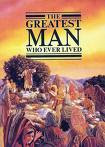
Takes the Life of Jesus Christ from the Four Gospels and Presents them in Chronological Order
Come, Be My Follower

Explains Who Jesus Is and Why We Should Follow His Example in Our Daily Life
Pay Attention to Daniel's Prophecy

Explains the Book of Daniel in a Verse-by-Verse Format and Shows How His Book Has Meaning For Us Today
Live With Jehovah's Day in Mind

Takes an In-Depth Look at the Twelve "Minor" Prophets and Shows How Their Writings Benefit Us Today
The Secret to Family Happiness

Shows From the Bible What Families Can Do to Survive in This World Today
My Book of Bible Stories

Takes the Most Famous and Loved Stories From the Bible and Presents Them for Children--Fully Illustrated
Is There a Creator Who Cares About You?

Using the Latest Understanding in the Scientific Field and the Bible to Prove That There is a Creator
Mankind's Search for God
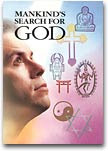
Gives an Overview of all the Major Religions of the World Including Islam, Judaism, Hinduism, Buddhism, and More
Knowledge That Leads to Everlasting Life

This is an older book that was at one time used by Jehovah's WItnesses to teach basic Bible doctrine
Jehovah's Witnesses--Proclaimers of God's Kingdom

This book presents the entire modern-day history of the Jehovah's Witnesses and their organization up until the year of publication--1993
All Scripture Is Inspired of God and Beneficial

A Book That Gives a Brief Review of Each Book of the Bible, Examines the History of Each Book, Why It Was Written, and More!
Insight on the Scriptures
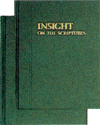
A Two-Volume Bible Encyclopaedia That Explains Every Person, Place, Thing, and Event in the Bible
The Watchtower Magazine
The Awake! Magazine
Jehovah God
Jesus Christ
- Jesus Christ-Who Was He?
- Is Jesus Christ God?
- A Birth to Be Remembered
- Lessons Jesus Taught-Are They Practical?
- Jesus' Miracles--Fact or Fiction?
- Reliving Jesus' Last Days on Earth
- The Resurrection of Jesus-Fact or Legend?
- Jesus Saves--How?
- How Jesus Can Change Your Life
- Christ's Coming-How Does It Affect You?
The Bible's Viewpoint
- What Was the Original Sin?
- What Happens at Death?
- Should You Pray to the Virgin Mary?
- Should Icons Be Used In Worship?
- Should Christians Expect Divine Protection?
- Prayers That Are Heard By God
- Is There Only One True God?
- Is the Holy Spirit a Person?
- Is It Wrong to Drink Alcoholic Beverages?
- Do Humans Become Angels When They Die?
- Does the Bible Discriminate Against Women?
- Does Science Contradict the Creation Account?
- Does God Approve of Same-Sex Marriage?
- Did Jesus Really Die on a Cross?
The Bible in Your Life
- What Hope for the Poor?
- Keep Your Children Safe!
- Why Care About Spiritual Things?
- Blood--Why So Valuable?
- Enjoy Family Life
- How Can You Find Inner Peace?
- Should You Live Only For Today?
- How Can You Benefit From Godly Principles?
- You Cannot Save It, So Use It Well
- Building on Pagan Foundations
- Hope--Where Can You Find It?
Biblical Answers to Questions Young People Ask
- Why So Many Rules?
- Why Does God Let Us Suffer?
- What's Wrong With Premarital Sex?
- How Can I Stop the Gossip?
- How Can I Help Those In Need?
- How Can I Cope When Trajedy Strikes?
- How Can I Avoid Getting Involved With the Wrong People?
- Homosexuality--How Can I Avoid It?
- Dabbling in the Occult--What's the Harm?
Visitors
The Bible says, "The heavens declare the glory of God; the skies proclaim the work of his hands." (Psalm 19:1) When we consider the marvelous works of our God, it should move us to "bend [our] knees" to Him. (Ephesians 3:14) Let us all be moved to thank our God and Father for all he has done for us. In the words of King David: "Every breathing thing--let is praise Jah. Praise Jah you people!"-Psalm 150:6

